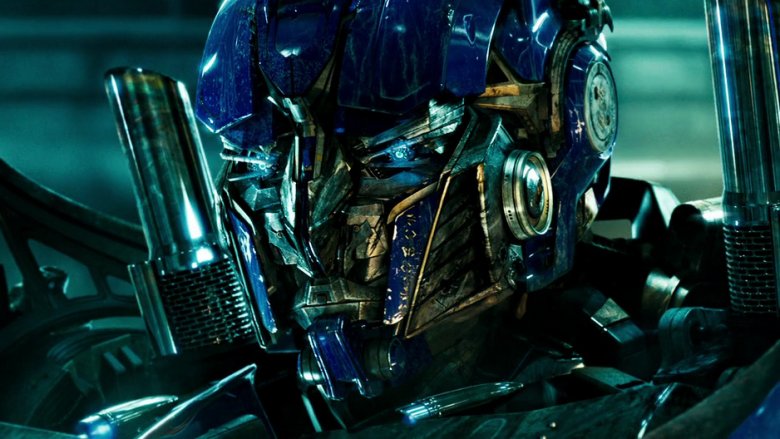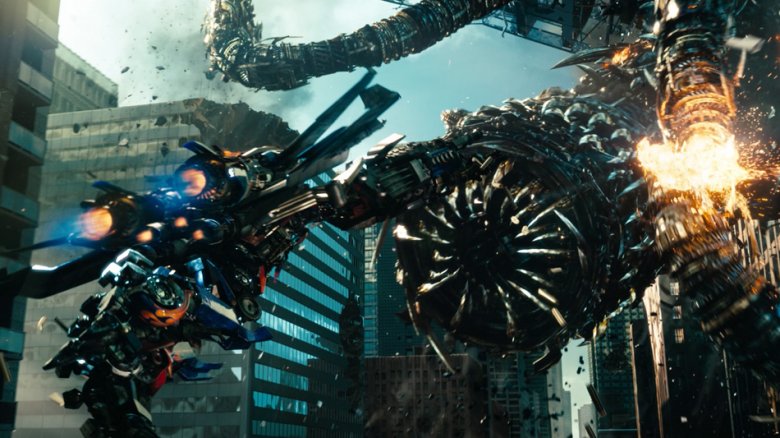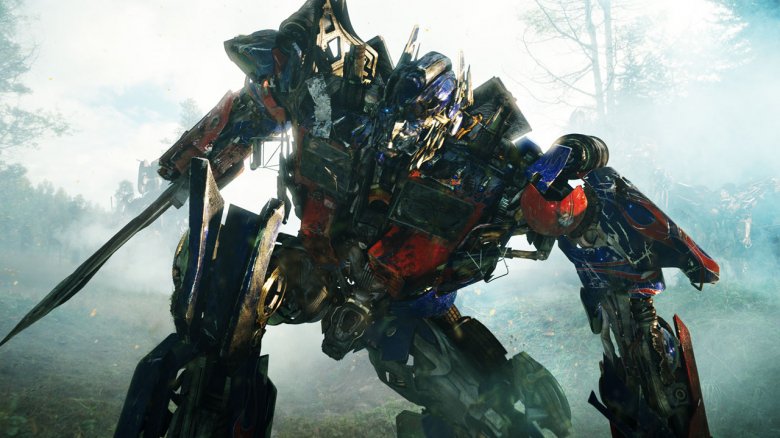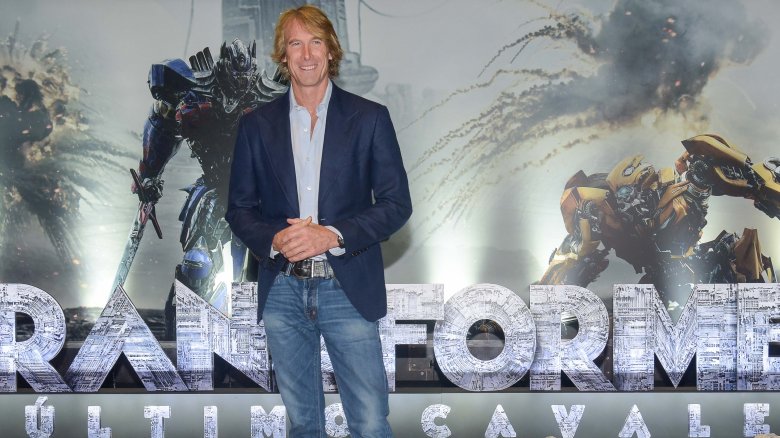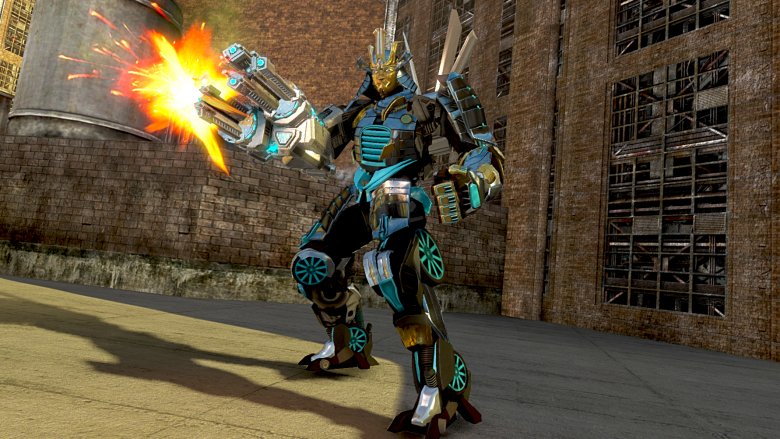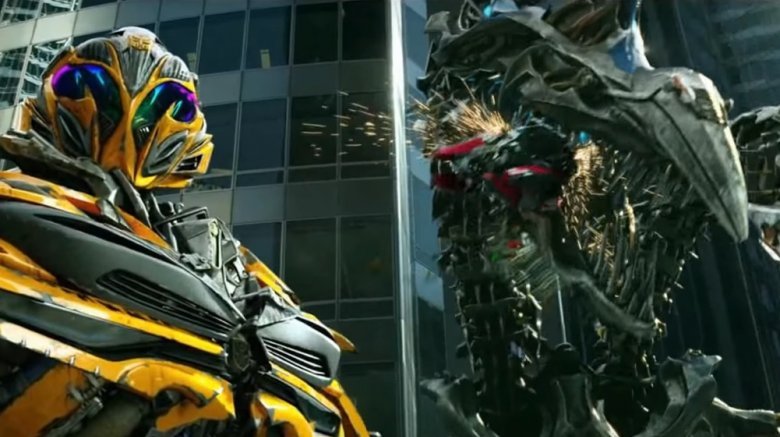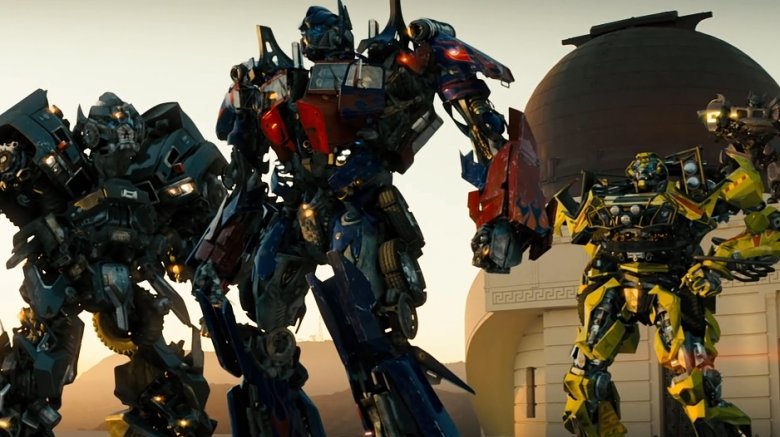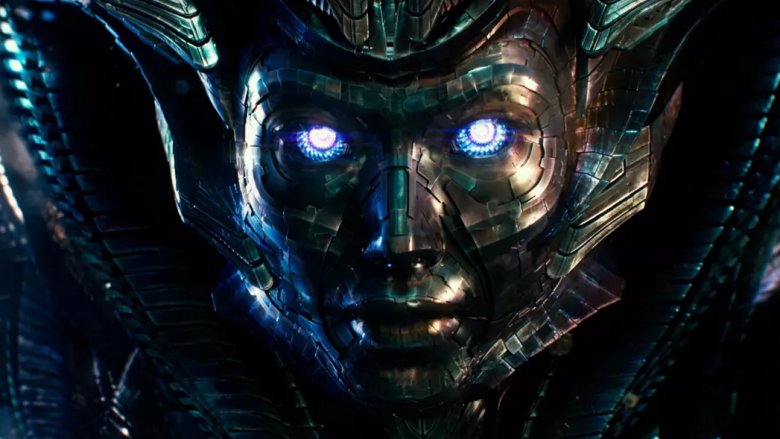The Real Reasons Transformers 7 Was Canceled
The Transformers franchise has been nothing if not divisive. While some fans have stood by the films, the majority of critics — and plenty of average moviegoers — have criticized its emphasis on noisy CGI style over storytelling substance. Still, they've raked in a combined total of over $4 billion, proving there's an audience for this series. Or there was, anyway — Transformers: The Last Knight, the fifth entry in the saga, earned the least amount of money, not to mention the worst reviews.
The sixth installment in the franchise, a spinoff focused on the Transformer known as Bumblebee, is set to arrive in late 2018, but it's unclear what will come next: Paramount has tabled plans to make a Transformers 7 for the foreseeable future. Why would the studio stop the machine that transformed a toy line into a multi-billion-dollar global cinematic affair? The answers might surprise you — read on to find out the real reasons Transformers 7 was canceled.
Critical disdain
No studio wants to invest years of development and millions of dollars in films that critics end up trashing with negative reviews. While that concern is usually secondary to box office grosses, the reality is that with the Transformers movies, Paramount was seeing both dwindle at roughly proportionate rates. Maybe the series' downward-trending Rotten Tomatoes scores were indicative of a larger problem. Perhaps the average moviegoer finally saw what the critics saw in these films, and consequently chose not to see them anymore. It's hardly unusual for action blockbusters to earn middling-to-negative reviews, but the Transformers pattern was clear: the movies were entertaining fewer and fewer people as they went along.
It's taken five increasingly painful green splats on Rotten Tomatoes, but maybe Paramount's finally taken the series' critical reception to heart, and canceled plans for Transformers 7 because they realized that something needs to change in order for it to remain a viable franchise.
Financial struggles
Following the second entry, 2009's Transformers: Revenge of the Fallen, domestic ticket sales have dropped with each entry in the Transformers franchise. Between the fourth installment, 2014's Age of Extinction, and The Last Knight, the domestic box office shortfall is over $115 million. That's a lot of money, especially considering that Knight's entire production budget was a little under double that amount. These movies are extremely expensive, and if audiences are snubbing sequels to such a degree that more than $100 million is disappearing between chapters, maybe it's time for Paramount to reassess.
U.S. audiences aren't the only ones tiring of the franchise — it's been on a global financial decline. Comparing Age of Extinction to The Last Knight, the latter raked in $500 million less than its predecessor on the global stage. Losing the battle for filmgoers' wallets at home and abroad, it makes sense that they've canceled Transformers 7 instead of throwing more good money at an increasingly risky bet.
Bye to the Bay
Very few people are qualified to direct a $200 million movie. Even getting a film like this out the door requires an immense amount of technical skill, leadership, coordination, and planning. This is why, like him or hate him, studios respect Michael Bay and his particular set of skills. That's also likely why Paramount felt comfortable handing him the reins five times in a row for the Transformers films, even as they continued to decline. Bay's been making noises about leaving the franchise for years, but the studio kept making him offers he couldn't refuse — presumably to avoid having to deal with the gaping hole he left in the studio's directorial lineup when he officially departed from the franchise after The Last Knight. Without Bay, Paramount doesn't yet have a go-to guy that can guarantee the successful production of a blockbuster Transformers film. Sorting out the creative vision for the next phase of the series likely any hopes of assembly-line producing another installment in time for its targeted 2019 release date.
Failure to expand the brand
Most movie franchises strive to expand the overall brand and boost its success across other mediums, but that's easier said than done, and the Transformers movies are proof. Considering the movies started with some toys, you'd think this would have been easy work, but we've only seen some decent action figures, a smattering of lackluster video games, and a line of comics.
While Transformers, having always been a toy-based IP, has maintained strength in the action figure market, the Transformers movies were a prime opportunity to broaden the brand's scope. However, the publishing license remains stuck at a B-tier comic book company, and as far as video games are concerned, every Transformers movie-related tie-in game has been met with middling reviews — or worse. In 2014, Transformers: Rise of the Dark Spark turned a prequel-sequel to the successful game Transformers: Fall of Cybertron into a lackluster movie tie-in sequel hybrid, and effectively nuked what was otherwise a strong video game offshoot of the Transformers brand.
Paramount's priorities
Paramount's got a lot of movies lined up in 2019, which means a lot of money is already at stake. Currently, they're slated to release the Top Gun sequel, an untitled Terminator project, and a Sonic the Hedgehog video game adaptation, all in the same year that Transformers 7 was originally scheduled to debut. Each one is risky in its own way. Old franchises being resurrected are always a toss-up, it's been a good long while since a Terminator movie did well, and last, but definitely not least, is the Sonic the Hedgehog movie, also known as Paramount's chance to destroy the video game movie stigma. However, given the rookie team behind it, odds are not in Sonic's favor.
Given all the money on the line with these three risky films, and each of their respective stakes, it's only logical that Paramount wouldn't want to further strain their resources on a seventh installment in a franchise that's been facing critical disdain and dwindling box office receipts.
What's the rush?
Maybe Paramount execs have realized that churning out these films every two to three years, regardless of quality, isn't beneficial to the long-term health of the franchise. Perhaps higher-ups at the studio have come to realize that, when a ship's been sailing in the wrong direction for as long as this one has, it takes more than a couple of years to turn things around. Transformers is a premium franchise, after all. It deserves the best blockbuster writing and directing, two jobs that take quite a bit of time to do effectively. Heck, canceling Transformers 7 might actually result in the movie getting some quality CGI — something that's been absent both in Age of Extinction and The Last Knight, possibly due to those movies' visual effects houses not having enough time to work.
This delay might also result in fan anticipation going up and audience fatigue going down. Time heals all wounds, and maybe wounded fans will be more receptive towards a new Transformers movie if they're given some time without one.
Bumblebee's gambit
Paramount might also be unwilling to proceed with Transformers 7 until the Bumblebee spinoff results are in. If it's the franchise's last hope, it's in good hands:, it's being directed by the supremely talented Travis Knight (who delivered the magnificent Kubo and the Two Strings), so there's a chance Paramount might be waiting to see how he fares before they assign a director to Transformers 7 and get that project back up and running. If it bombs, well, that's one more reason why the studio would be right to wait and get their Transformers house in order before sinking any more money into a critically and financially flailing franchise. If Bumblebee is a bust with critics and audiences, it won't matter how good a job Travis Knight did — it'll likely be the end of the line for the Transformers franchise as we know it, for better or worse.
Reboot time
Franchise reboots have become fairly common — just ask Spider-Man — and a complete Transformers do-over would achieve a lot of things at once. It would wipe out the absolutely bonkers plot that's built up to this point, giving the writers a fresh start. It could also earn a fresh start with fans, provided Paramount shows proof that they've learned from past mistakes (fewer humans, more Transformers, please... and no Knights of the Round Table, while we're placing requests). And, most importantly, where there's a clean slate with fans, there's one with box office prospects. A reboot could single-handedly fix the financial woes the Transformers movies have suffered — and there's even a chance critics might learn to like the series, if a reboot with some heart, brains and good old-fashioned fun wiped away the sour taste of its predecessors. All it takes is one press of the reset button, and Transformers can potentially re-emerge as the franchise it was always supposed to be: one every fan, cool adult, average teenager, and blockbuster aficionado on the planet can get behind.
A convoluted narrative
While it's generous to say the Transformers franchise ever made a lick of sense, the first movie's plot was simple: a boy finds out his car is actually an alien robot, and they go on an adventure to recover a magic cube from the robot's homeworld. It was just silly enough to work.
From there, the sequels churned out an increasingly convoluted narrative. In Revenge of the Fallen, Optimus Prime died and was brought back to life by an ancient dagger disguised as a pile of sand. Then, in Transformers: Dark of the Moon, it was revealed that the Decepticons had been within range of Earth for decades, and were simply waiting for the right moment to reveal themselves...which happened to be when their only threat, Optimus Prime, landed on earth. Transformers: Age of Extinction went even further back in time, with prehistoric dinosaur Transformers and a story in which Earth's rarest minerals were spawned by an alien race who were somehow linked to the Transformers. Then The Last Knight revealed Bumblebee was a World War II veteran — and that Shia LaBeouf's character from the first three movies was a descendant of the Knights of the Round Table.
Where could the writers have possibly gone from there? Fortunately, it doesn't look like we'll have to find out.
